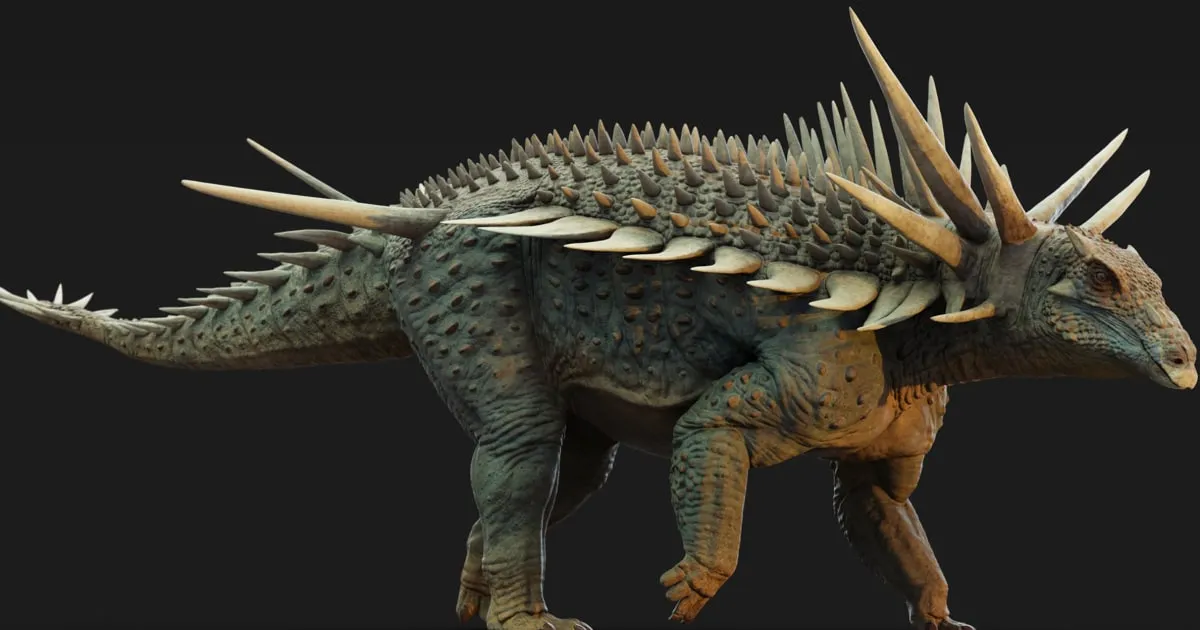
In an astonishing revelation, scientists have uncovered the fascinating features of the Spicomellus, a dinosaur that roamed the Earth approximately 165 million years ago in what is now Morocco. This remarkable creature, known for its bizarre morphology, has long been recognized, but recent research has provided a comprehensive look at its unique characteristics, prompting a significant rethink among paleontologists. According to renowned paleontologist Susannah Maidment, who co-led the research team, “This dinosaur is totally unlike anything else that we have ever seen.”
The findings, published in the prestigious journal Nature, detail the fossilized remains of this Jurassic-era dinosaur found in the Atlas Mountains near the Moroccan town of Boulemane. The Spicomellus is classified as the world’s oldest ankylosaur, a group of short-limbed, heavily armored herbivorous dinosaurs known for their robust bodies and four-legged stance. The evolutionary history of these creatures is often obscured due to a sparse fossil record, making this discovery particularly significant.
Prior to this revelation, only a single rib fragment described in 2021 provided any insight into the anatomy of the Spicomellus. However, the new research unveils a creature adorned with short spikes on its back, a protective pelvic shield, and two prominent spikes protruding above its hips. Notably, the fused tail vertebrae suggest that the dinosaur might have possessed a formidable weapon at the end of its tail.
The study proposes that the ornate armor of the Spicomellus served dual purposes: it provided defense against large carnivorous dinosaurs and acted as a display mechanism to attract potential mates. Project co-lead Richard Butler, a paleontologist at the University of Birmingham, expressed his astonishment at the creature’s uniqueness, stating, “We just couldn’t believe how weird it was and how unlike any other dinosaur, or indeed any other animal we know of, alive or extinct.”
The excitement surrounding the Spicomellus discovery extends beyond the research team. Steve Brusatte, a vertebrate paleontologist at the University of Edinburgh, described the dinosaur as “one of the weirdest, wackiest dinosaurs I’ve ever seen.” He likened its appearance to that of a “reptilian porcupine,” emphasizing the bony spikes that protrude from its body. Brusatte also remarked on the implications of this discovery, stating, “If you were a meat-eating dinosaur living back in the Jurassic period, you would stay well away from this animal.”
The discovery of the Spicomellus underscores the vast potential for further paleontological research in Africa, particularly in Morocco, which Maidment describes as “an untapped gold mine for dinosaur research.” She noted that the continent is significantly undersampled compared to others, highlighting the promise of future discoveries.
The Spicomellus project, which began in 2018, faced numerous challenges, including delays caused by the Covid-19 pandemic. The U.K. research team was scheduled to travel to Morocco to collaborate with local scientists when lockdown measures were implemented, pushing their plans back to 2022. Despite these obstacles, the research has made a significant contribution to the scientific community in Morocco.
Driss Ouarhache, who led the Moroccan team, stated, “This study is helping to drive forward Moroccan science. We’ve never seen dinosaurs like this before, and there’s still a lot more this region has to offer.” The discovery of the Spicomellus is not just a breakthrough in dinosaur research; it represents a pivotal moment for paleontology in Africa, encouraging further exploration and study of the continent's prehistoric past.